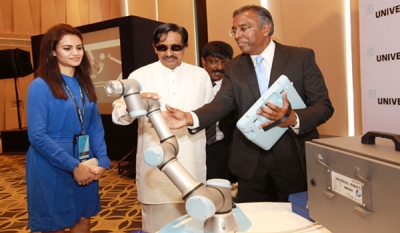Universal Robots, a Danish robot manufacturer which invented and pioneered collaborative robots or ‘co-bots’ as they are popularly called, presented this technology to the Sri Lankan market and talked about the availability of this technology to various industries.
The event was attended by the key stakeholders that define this technology, including the General Manager of the company (India & Sri Lanka region) and a host of other dignitaries representing the Government and customers.
Collaborative robots, as the name suggests, are a technology upgrade from industrial robots which are designed to collaborate and work with humans and assist them in a variety of tasks.
Co-bots can be especially useful in ensuring a safe work environment, which can also help automate and streamline repetitive and potentially unsafe processes, while acting as a helping hand to increase productivity and efficiency.
For a country like Sri Lanka, which is looking at a fast pace of development and at the same time would like to adopt cost effective, yet efficient technology, co-bots would be the right way to go, especially for the Small and Medium-Sized Enterprises which form a major part of the business eco-system.
In the words of the Founder of this technology and the Chief Technology Officer, Dr. Esben Ǿstergaard, “We are happy to have contributed to the evolution of robots in the past and we will strive to nurture it and take it to the next step with human robot collaboration.
Collaborative robotic technology can be used to benefit all aspects of task-based businesses irrespective of their size.
Our robot arms are advanced tools that can be used by all levels of production staff to help increase productivity, and quality.
Our collaborative robots will help to ease out processes in task driven industries like manufacturing, assembly and food processing.
However we have seen lot of out of box applications due to the ease of programming of our co-bots.”
Speaking at the launch event at the Hilton Colombo, Pradeep David, General Manager, Universal Robots said, “The growth of the economy of a nation, would be gauged by increasing productivity in industry as a whole and in future co-bots would be a critically important factor as Human-Robot Collaboration is an integral part of Industry 4.0.
In a developing economy like Sri Lanka, automation in every field will enhance production and generate advancements in the technological sector.
With the launch of co-bots, companies would be able to enhance productivity levels close to 85%.
Collaborative robotic technology can be used to benefit all aspects of task-based businesses irrespective of their size.
We have a full-fledged application lab setup in Bengaluru (Indian headquarter) with a UR3, UR5 & UR10 for customer training and proof of concept purposes.
We are delighted to be able to provide the platform required for the Sri Lankan market for increasing productivity, quality, and market competitiveness.”
Universal Robots has been servicing global Corporations in all industries such as BMW, Volkswagen, Siemens, General Electric, Calvin Klein, Johnson and Johnson, John Deere, Trelleborg, Orkla Foods, Hindustan Unilever, Bajaj, IIT Kanpur to name a few.
These Co-bots are utilized for an assortment of out-of-box functions ranging from photo shoots, bartending, fashion shows, coffee machines, surgical procedures and even for physiotherapy and sports therapy procedures.
Few examples of co-bots being used in various off-beat industries.
Emma, short for Expert Manipulative Massage Automation has been designed to carry out highly-articulated movements for various sports injuries.
Mr. Mofongo’s, a hidden bar and restaurant in the city of Groningen, the Netherlands, where the cocktails are served by the robot arm Armando!
The co-bot collaborates with the bartender for this application to fetch the drinks for the customer.
In Singapore, co-bots are being used to make dosas & omelettes with the help from our distributor Kurve Automation, as further added by Pradeep David.
According to a research conducted by capital goods analyst Barclay’s, the global co-bot market is set to grow from US$116 million last year to a whopping US$11.5 billion by 2025 at a CAGR of over 50%.
Another study conducted by MIT researchers on the success and adaptability of co-bots at a BMW factory, proved that teams made of humans and robots collaborating efficiently can be around 85% more productive than teams made of either humans or robots alone.
Also, the cooperative process reduced human idle time by virtue of its pace-setting ability.
Universal Robots, since 2003, has been working on developing compact, user-friendly collaborative robots to make advancements in the field of automation and to bring automation in various verticals of different industries.
Persistent efforts resulted into the evolution of robot arms – UR3, UR5 and UR10 which can carry a payload of 3kg, 5kg and 10kg respectively.
UR3: UR3 is a new, smaller collaborative table-top robot for light assembly tasks and automated workbench scenarios.
The compact table-top robot weighs only 24.3 lbs (11 kg), but has a payload of 6.6 lbs (3 kg), 360-degree rotation on all wrist joints and infinite rotation on the end joint.
These unique features make UR3 the most flexible, lightweight, collaborative table-top robot.
UR5: UR5 lets you automate repetitive and dangerous tasks with payloads of up to 5 kg.
The UR5 is ideal to optimize low-weight collaborative processes, such as: picking, placing and testing.
The UR5 from Universal Robots is very easy to program, offers fast set up, is collaborative and safe to work with.
UR10: UR10 is a large industrial robot arm which performs heavy-weight collaborative processes, such as packaging, palletizing, assembly and pick and place.
With the industrial robot arm - UR10 - you can automate processes and tasks that weighs up to 10 kg and is designed to be more effective at tasks across a larger area.
About Universal Robots:
Universal Robots makes robot technology accessible to all levels of industry.
Since the first UR robot entered the market in December 2008, the company has seen substantial growth with the user-friendly robots now being sold in more than 50 countries worldwide through a network of over 300 distributors.
By offering a user-friendly, affordable robot, Universal Robots lowers the automation barrier enabling automation in areas previously considered too complex or costly.
The company is headquartered in Odense, Denmark, where all development and production is carried out.
The Indian headquarter is based in Bangalore.






















